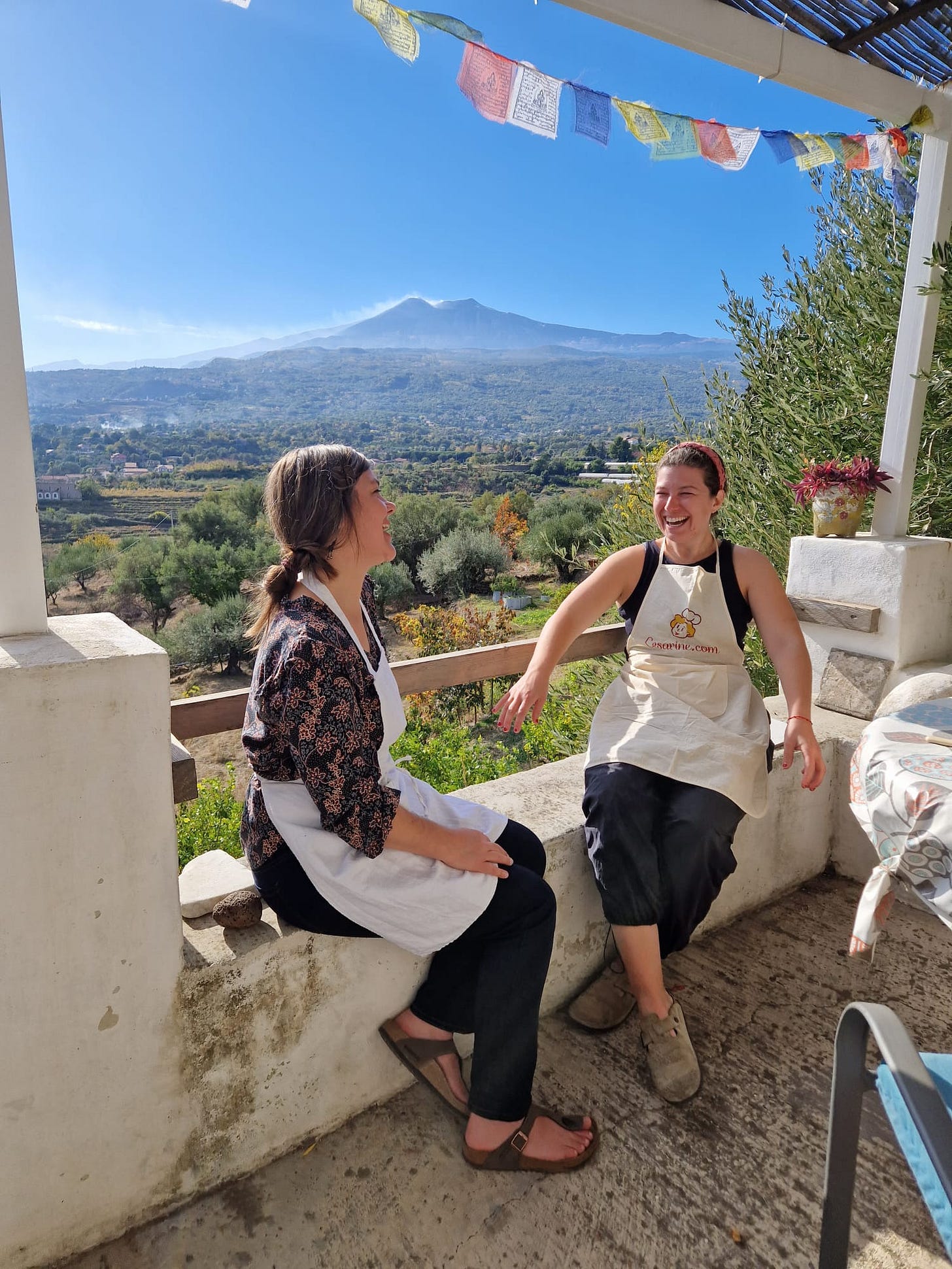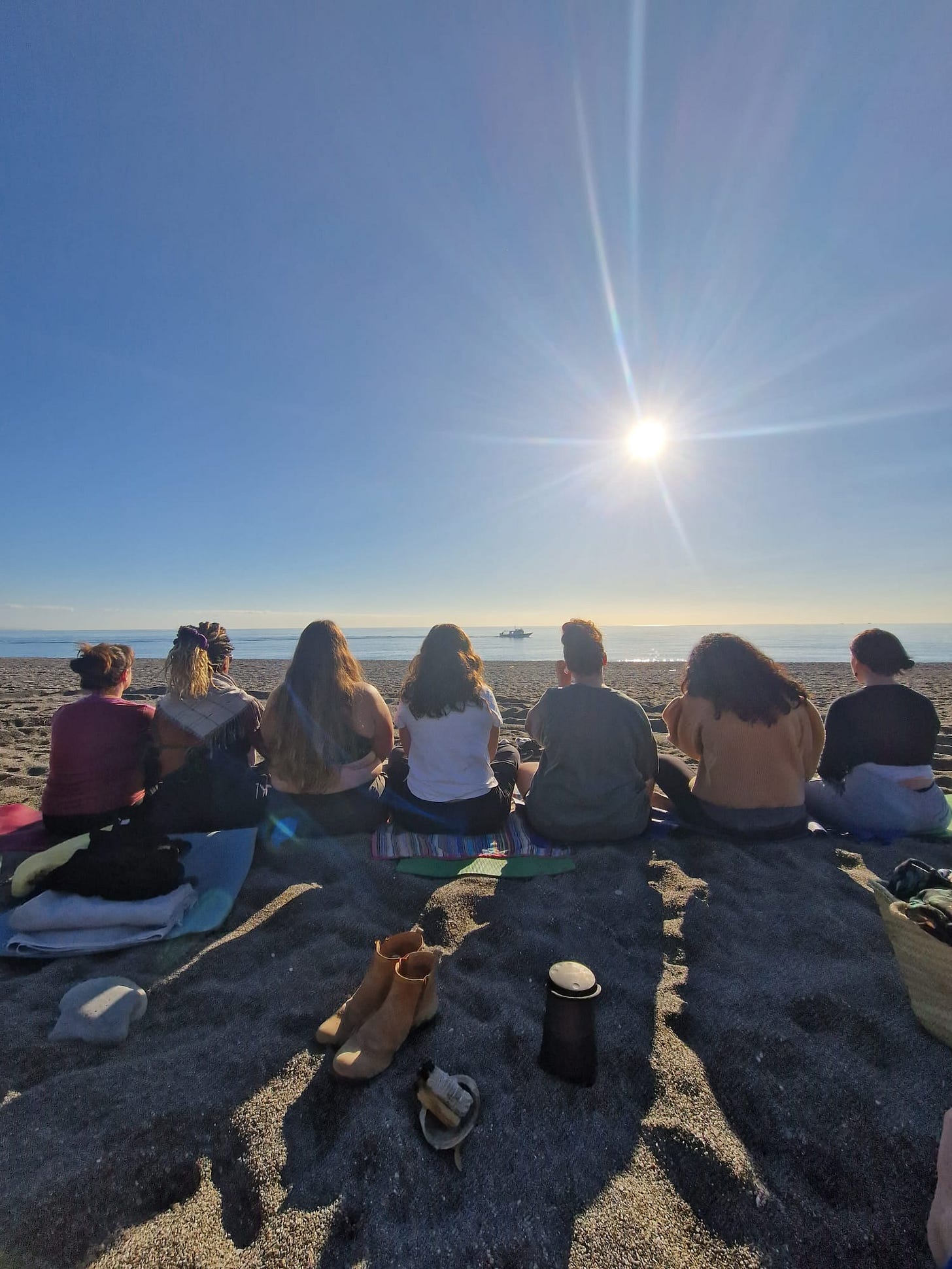Michelle Titus was a digital nomad before the word existed, as an international correspondent and, later, a publisher. She and other professional women she knew experienced corporate flats and many Airbnb stays as soulless. Seven years ago, self-examination led Michelle to plan an escape from corporate life. She then traveled the world to learn from wise women, heal, and explore what was next.
Michelle's transformation led her to Sicily in 2019, where she felt it would provide her the best opportunity to hold space for a community of women. She dreamed of creating a safe place for women travelers to work and, most importantly, create lasting bonds. Cummari, the name for her vision, is an ancient Sicilian word meaning female solidarity and a special bond between women: "those who came and never left." While the word's meanings have evolved, at its core, it describes relationships between women characterized by acceptance and authenticity.
In 2021, Michelle opened Cummari in Catania, a city on the east coast of Sicily. She and her architect partner Igor renovated a 19th century building, formerly a dental practice run by two sisters. They converted the building into a three bedroom apartment with a shared terrace. The opening of Cummari coincided with the onset of COVID-19, and women of all ages came and stayed for extended periods. Michelle lived nearby on Volcano Etna with her partner and spent most days in community with her guests. Coincidentally, her partner is from Sicily, although they met while he was living abroad. Michelle asked him to return to the island where he grew up so she could build her dream.
In the first iteration of the community, Michelle created something she wanted for herself, hoping that others would desire it, too. She built it, and they came. Michelle, together with her guests, created something special. Over three years, she received feedback from the women she hosted about improving the Cummari experience. Based on these conversations, she took a risk and relocated Cummari to Riposto, a seaside port village that lies between Catania and Taormina in the shadow of Mt. Etna. With fewer tourists than nearby Taormina, it maintains its authenticity while offering restaurants and a seaside promenade. Cummari guests can run and walk along the sea, safe from traffic.
The new home is under renovation and will hopefully be ready for guests in early 2025. Michelle keeps the women who have been part of the community in mind as she designs the features in the new house.
In the year it took to find the new location, Michelle held retreats at several places on the island, though she missed the depth of connection made possible by living together. "Being in pajamas and making coffee for each other day after day, we were together when good or bad things happen," she said. "I witnessed how these bonds formed, with me, with each other, and also bonding with the larger idea of Cummari."
I spoke with Michelle about Cummari's evolution and her understanding of community. Like other conversations I've had in my research on belonging, talking about our experience of community formed an immediate connection. Central to Michelle's mission with Cummari is the creation of relationships. Her experience with the women she hosted was reciprocal, and both they and she were touched and changed. Building bonds is the magic of Cummari, which sets it apart from other co-living branding efforts that are more about investors and scaling rather than belonging and connection.
One hallmark of a vibrant community is that it is generative, inspiring those touched to find ways to spread it. Cummari has the vibrant energy and abundant spirit to create a movement, addressing a healthy longing for connection and developing novel ways for women travelers to participate.
The spirit of Cummari creates a portal that invites connection. Michelle supports anyone who wants to build Cummari anywhere in the world. For example, past guests who are writers have initiated conversations about starting a writing collective. Guests who have never met but have stayed in the house at different times have connected online and later met in cities worldwide.
A past Cummari guest, Maggie, wanted to buy a farm nearby to start a winery. Once she found the land to farm, she needed a house to live in. Michelle connected her to two men who have a home there but spend most of their time in Alaska. She is now building her own house with the help of Michelle's partner, Igor. Now, this woman is Michelle's confidant and also an important person in her family's life.
There has also been cross-pollination with Cummari guests and Michelle's Sicilian community of women, Zingarelle. Some women in Zingarelle are mothers, and the Cummari community offers them an opportunity to re-engage with their gifts and share them.
Michelle reflects on ways to preserve the beauty of the Cummari experience while meeting her responsibilities, like paying bills. She says that when she left the corporate world seven years ago, she also stepped away from the masculine side of survival. She now experiences the creative tension between nurturing community spirit while learning feminine ways to set limits.
Michelle wants to nurture community outside hosting in the Cummari home. For example, she is enrolling in a two year program with the International Academy for Modern Matriarchal Studies in Germany. For Michelle, exposing other women to the hopefulness of our matriarchal past is a way to serve those who don't come to stay at Cummari. She believes "it gives strength to learn about it because it was so peaceful."
Michelle said Sicily has a female spirit; goddesses have historically been revered there. Island folklore claims that the Goddess Aetna is behind the eruptions of Mt. Etna. Sicily is also the island of the Sicilian goddess Kore (or Persephone to the Greeks) who was kidnapped by Hades. Kore became Hades' wife and is said to live half the year in the underworld, returning to Earth in the spring to grace the island with abundant fertility. The Sicilians still celebrate Kore every spring.
The first Cummari home previously belonged to two sisters and opened with many of their furnishings and treasures. Pictures of the sisters remained as well, honoring the house's female energy. The sisters' round table, where women gathered and cooked for each other in Cummari and a community focal point, will find a home in the new location.
Michelle bought the new property from two men, which felt incongruous with Cummari's spirit, but the space was right. Then, while she and her partner were going through the paperwork to get information for a mortgage application, they discovered that in the 1800s, a mother gifted her daughter the house as a wedding present. Transferring property to a daughter would have been virtually unheard of at the time, and it was a sign to Michelle that the new location was meant to be.
Reflections
For women readers, where do you find Cummari in your life?
(For the men who are reading, there is a Sicilian male counterpart named Cumpari.)
What concrete steps can you take this month to nurture the spirit of Cummari?










Wow, I love this concept so so much!! Thank you so much for sharing it, I’ll definitely have to stay there at some point 💖